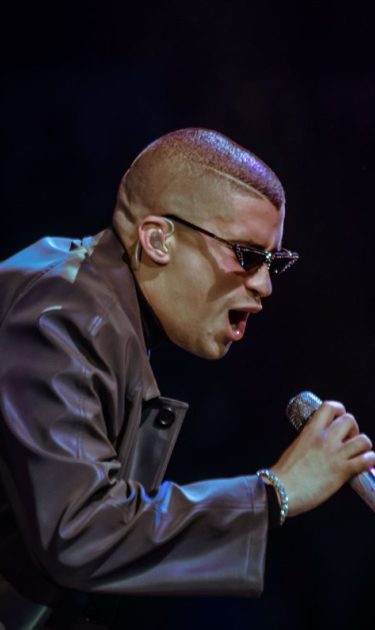Amid a sea of light-up bunny ears, third eye bandanas, and clout goggles, Bad Bunny is leaping across a 360-degree stage as the deafening roar of almost 18,000 fans drowns out the ukulele strums of his song “Ni Bien Ni Mal.” Over the course of the next four hours, Puerto Rico’s largest perreo of the weekend would unfold; thousands of Boricuas would herald the return of their triumphant hometown hero, as he embarked on the first of his three-night run at Hato Rey’s El Choliseo arena, performing over 40 songs from his catalog with dozens of guests. Benito Antonio Ocasio Martinez beamed from the LED-lit stage, radiating the kind of charisma only possible for a newly coronated superstar.
The significance of this homecoming concert wasn’t lost on the Vega Baja rapper; every detail of the show was a deft reference to the public persona that Benito has cultivated. Elaborate installations, conceptualized by local creative agency Buena Vibra, appeared throughout the arena, including a full-service arcade, complete with old school games like Galaga; a custom nail art salon, a wink to Bad Bunny’s love of manicures; illustrated visuals through nearly every song (including a hilarious collage of Sonic Youth, Dead Kennedys, Linkin Park and Blink-182 posters during “Tenemos Que Hablar”); and even a series of horoscope booths with branding from Puerto Rico’s favorite Instagram astrologist and illustrator, Mela Pabón. “Everything started with Benito’s vision to bring a sensorial experience to the event, not just an audiovisual one,” the agency tells Remezcla. “We wanted to create visual storytelling that was directed by our team, several illustrators from Puerto Rico and California.”
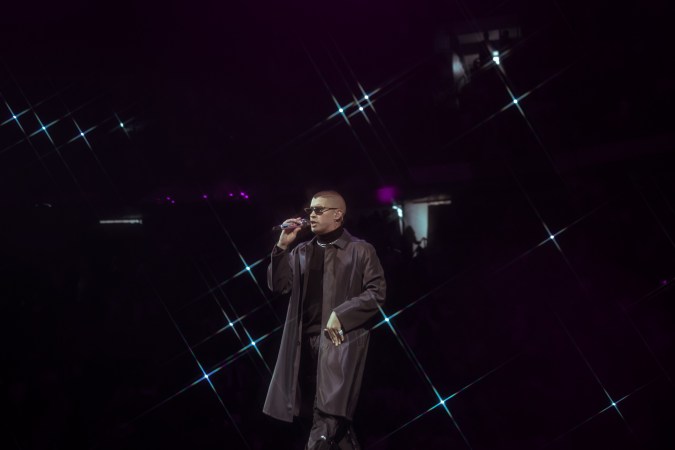
Fittingly, El Conejo Malo opened this momentous homecoming with a 10-minute video introduction chock full of references only his fellow Boris would understand, including a spoof of the late-night talk and variety show No Te Duermas, featuring Los Rivera Destino, the trio famous for their bolero reimagining of “Te Boté,” the model Mimi Pabón, and social media personality Jovani Vasquez, as well as plenty of characters from the program. As the parody came to a close, a contemplative voiceover from El Conejo Malo boomed through the arena, broadcasting a speech on self-determination and the pursuit of happiness. “You’re born and then you do what you’re supposed to…from the most simple things, like washing your own dirty clothes, to working every day to put food on the table, to even letting your dreams fall apart. Or you fight for those dreams until the end. That’s the difference between being stuck telling yourself ‘never’ and building a legacy that lasts forever.” Snapshots of a woman in rolos hanging up laundry to dry on her roof, as well as an abuela sitting in her rocking chair, flashed across the 360-degree screen, capturing a quotidian, slice-of-life portrait of life in PR.
In part, it’s this kind of philosophical musing and unrelenting commitment to represent his roots that’s endeared Bad Bunny to so many Boricuas. Whether it’s his tweets about practicing self-love, subtle social critiques, or earnest social media posts inspiring others to follow their dreams, Bad Bunny has never been afraid to be outspoken, to inspire, and to set himself apart from his peers in música urbana, in the process appealing to audiences from all walks of life.
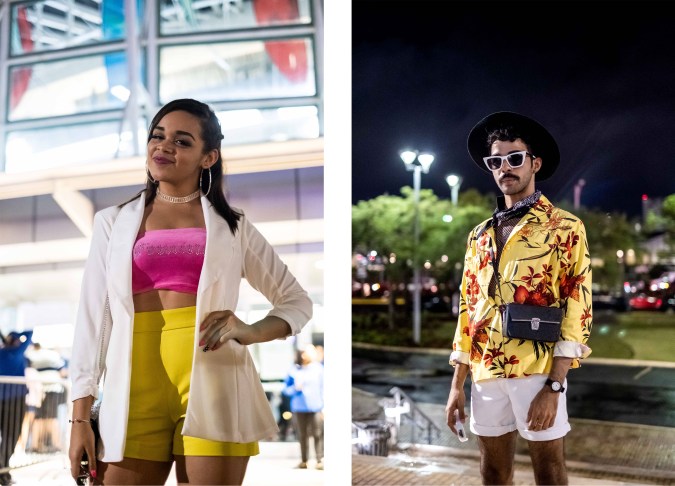
“Everything that comes out, for me, does not feel or seem forced, which means that he’s not really trying too hard, he’s just being himself,” says Paxx Caraballo Moll, a fan who attended Friday’s show. “He’s just speaking from the heart. I know that sounds super corny, but honestly, eso es lo que me tripea, because he’s totally relatable.”
In addition to cultivating that authenticity, over the last year, we’ve seen El Conejo Malo undergo a bit of an artistic evolution. On his debut album X100PRE, El Conejo Malo exhibited masterful versatility, shucking more commercial, traditional production tropes in música urbana and favoring ambitious experimentation, all while maintaining a pop format. It’s part of the reason El Conejo Malo has appealed to so many listeners, even those who aren’t traditionally reggaeton or trap fans. As Joel Cintrón Arbasetti, a long-time fan of Puerto Rican underground who distanced himself from reggaeton after its commercial explosion, says, “With Bad Bunny, I started to be interested in the genre again, because I found that he left behind what’s commercial.”
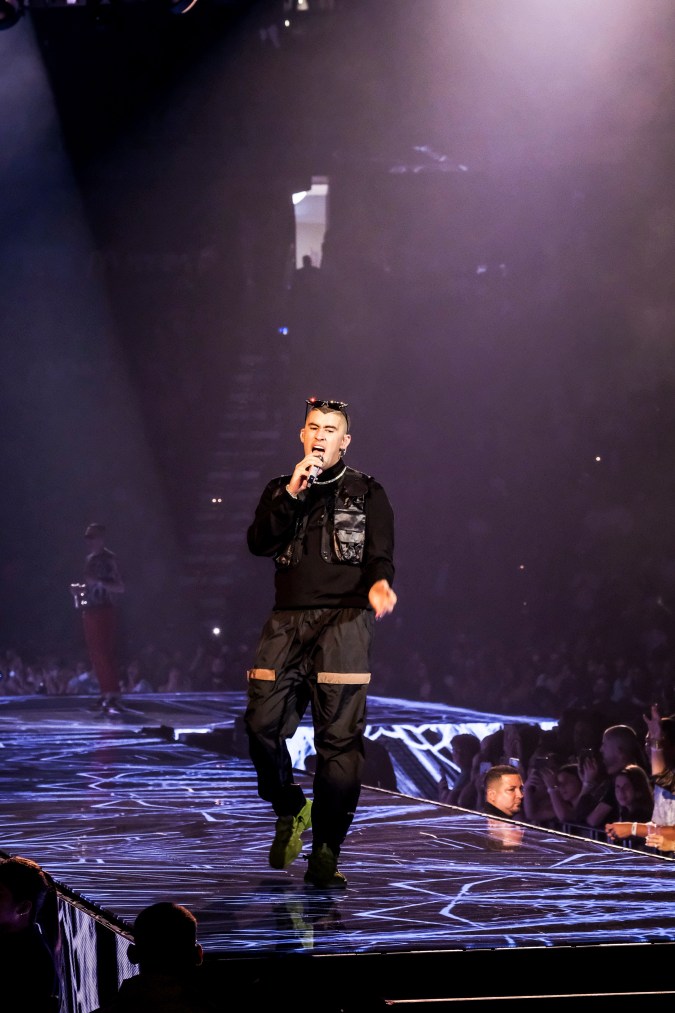
In September, for his first appearance on The Tonight Show, Bad Bunny condemned the Trump administration for its handling of Hurricane María. As our own Frances Solá-Santiago wrote last year, it was one of the first instances where Bad Bunny felt comfortable speaking about Puerto Rican social issues publicly. That eventually led to the video for “Solo de Mi,” which denounced violence against women, and then his infamous meeting with Governor Ricardo Rosselló earlier this year.
Katelyn Vasallo, a fan who attended Friday’s show, feels this attention to local issues is meaningful. “I feel proud that someone from my country is trying to elevate my homeland, and I know I’m not the only one. If this show is this full, it’s for a reason.” But she’s particularly grateful for his desire to highlight the endemic of gender-based violence on the island. “I love that someone who’s on top – someone who’s grown so much – is concerned with these things, because society doesn’t pay much attention to them. It’s good that he’s shedding light on it, so that it creates more awareness.”
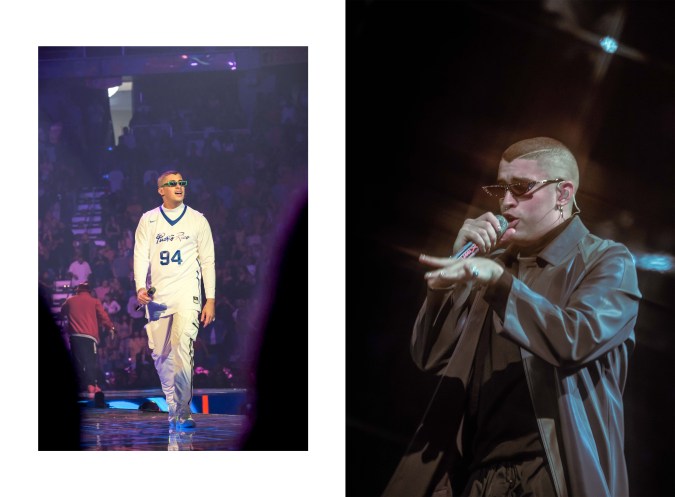
Vladimir Alvira, another fan at Friday’s show, echoes this statement. “In an industry like trap and reggaeton, which is very masculine and sometimes machista, the fact that he’s this way and presents himself this way, to me, is cabrón.”
“I feel proud that someone from my country is trying to elevate my homeland, and I know I’m not the only one. If this show is this full, it’s for a reason.”
For Cintrón Arbasetti, Bad Bunny’s meeting with the governor was more about unraveling the farce of Puerto Rican politics. “I don’t know what his exact intention was, but from what I saw, he demonstrated that an artist can have more access and power than anyone, and that shows that the government is just a total spectacle,” he says. It’s fitting that just last week, Rosselló organized a giveaway for Benito’s concert; even Rapetón noted that the move was clearly a stunt to “win the 2020 election.”
For Ínaru De La Fuente Díaz, an activist for transfeminist group La Sombrilla Cuir, Bad Bunny’s fame is especially complex in the queer community, given the genre’s continued problem with homophobia. “We talk a lot about dancing to reggaeton as feminists,” De La Fuente Díaz says. “We can empower ourselves to listen to it while still being a feminist and criticizing the lyrics…you should be able to criticize, and not [make] the person an idol.” For them, Bad Bunny’s subversion of gender norms has “helped many people in the community feel more empowered…it’s OK that he is able to break gender norms even inside his own music genre. But we also need to talk about how he is permitted to do that, because he still considers himself a man,” they say.
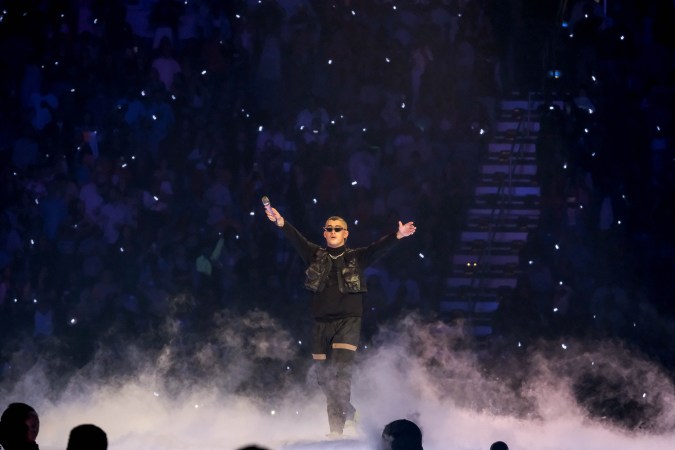
Ultimately, Ínaru is pleased a figure like El Conejo Malo exists. “He appeals more to me and queer people and trans people than other trap artists. That doesn’t mean that he represents me completely, but he appeals more to me than most of the trap people,” they add.
No matter where his political inclinations lead, one thing’s for sure: Bad Bunny’s impact has and will continue to be indelible. And as his celebrity continues to grow, it seems he will continue to uplift the community that fueled his rise. “Gracias Puerto Rico,” he said during the show. “Thanks to you, I have been able to follow my musical dreams and take them across the world, always holding my island’s name up high.”
Reporting by Isabelia Herrera and Jhoni Jackson.
